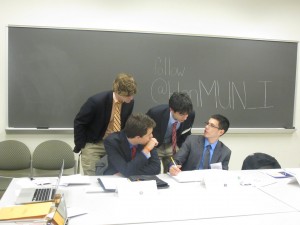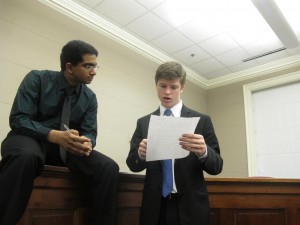In transitioning to small, specialized committees, one of the most daunting changes is certainly that the playing field is no longer equal. In General Assembly committees, there is at least a facade of equality: although some nations are certainly more influential, all nations are procedurally equal. They all have equal ability to debate, draft, and vote. All actions taken by General Assembly committees must be approved by the body as whole. For General Assembly, I generally tell delegates that your assignment is largely irrelevant, so long as the proper effort is put into research.
Such is not necessarily the case with specialized cabinets. Delegates are endowed with a portfolio, or a set of powers unique to them. The word “powers” is a little loose here; the portfolio can also refer to an assigned person’s set of skills and expertise.
For example, I was in a committee called the Hitler Assassination Strikeforce this past year at the Johns Hopkins Model United Nations Conference (JHUMUNC). The committee was a group of German Domestic Anti-Nazi figures, from varying fields (intelligence, military, politics). Each had a set of contacts, abilities and powers. It was not unusual for a military leader to, instead of asking the committee if military action is appropriate, announce that he had already mobilized troops an hour ago. Intelligence officers mobilized assassination schemes against fellow committee members. It is easy how this can lead to an environment of chaos, where committee action isn’t cohesive but rather scattered and individual. The main difference between a committee like this and a general assembly is that there is no equality between delegates: these committees do not share the egalitarian principles of the United Nations. For delegates new to specialized committees, this can be jarring: he or she now exists in a universe where assignment means everything. The assignment defines how you act and what you do. What it doesn’t affect, contrary to what many believe, is your ability to succeed.
Having been in several such committees, I’ve come up with a working model for effective portfolio usage. This model hinges on three principles: use your portfolio to make yourself invaluable, don’t let your portfolio alienate you from your committee, and strive for realism.
1. Use your portfolio to make yourself invaluable.
Your portfolio, however seemingly random, gives you a say in the committee: this is all but guaranteed. The goal of your research should be to find out why you are relevant, and why your committee should care about you. Study how your portfolio powers are absolutely essential to solving the problem at hand. Once you have figured this out, you need to come up with argument frames that highlight the aspects of the topic to which you are relevant (see: https://bestdelegate.com/how-to-win-best-delegate-framing/). If you are successful in this, you will become invaluable in your committee: that is, your committee will be relying on you, as they perceive you and your portfolio as indispensable tools for problem solving. This makes debate, lobbying, and bloc-leading a piece of cake.
This is possible even for those with seemingly random portfolios. Are you the religious minister in a committee dominated by military and intelligence delegates who have much more tangible powers? Make yourself the expert on ethics and social issues. Conversely, are you the military leader in a committee on economics? Make yourself the expert on foreign relations. Finding and defining your skill-set will empower you.
2. Don’t let your portfolio alienate you from your committee.
Being armed with a huge portfolio can be an incredible experience: the committee moves and stops at your will. However, it is easy to get tunnel vision, and forget that, in the end, you are still functioning as a part of a larger committee. I have seen delegates overuse their power, and never discuss their actions with their committee. Although these delegates are certainly being influential, they are not truly leading: they are separating themselves from committee. It is as if these delegates are their own committee that is not working with, but in parallel with the committee that they should be a part of. Furthermore, people with very specific portfolios that aren’t obviously connected to the task often alienate themselves from committees: I’ve seen clergy in economic committees do nothing but send random messages to the pope, and military officers send troops for no reason.
Instead, the portfolio, large or small, should be used to bring you closer to your committee. When you can, discuss your portfolio decisions with the committee before putting your plans in action, even though you don’t necessarily need to. Make your portfolio seem not like your asset, but your committee’s asset. If delegates see you acting as such, they will have a greater respect for your ability to work as a team player, and be less upset when you do perform portfolio actions, even if the entire committee doesn’t necessarily approve.
3. Strive for realism.
Don’t make your portfolio directives sloppily written, vague notes on torn computer paper that are tossed haplessly at the chair. Your portfolio directives are just as, if not more important than your committee resolutions, and should be treated as such. Take time to write them neatly, give them proper headings, and use carefully weighed and appropriate language. Even more important, take the time to furnish these directives with details. For example, If you are writing a military directive, make estimates for numbers of troops, and costs of action. Furthermore, another aspect of realism is realizing the constraints of your portfolio. Be careful not to overextend your power, or, even worse, step on the toes of other delegates.
Allow your directives to be a way for you to make your role-play unbelievably accurate. The employment period language, appropriate formatting, and accurate details and numbers will impress your chair, as these little things will show the depth of your research.





